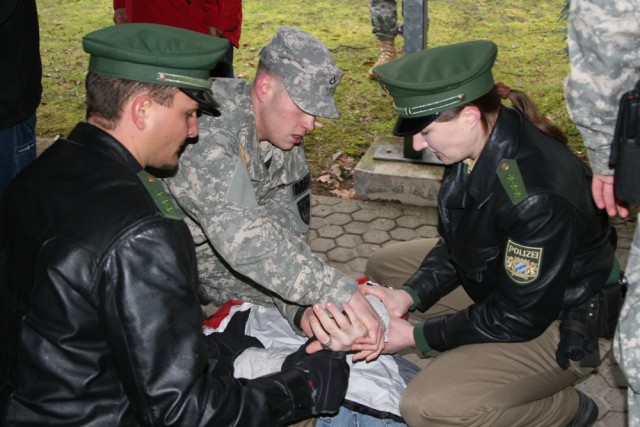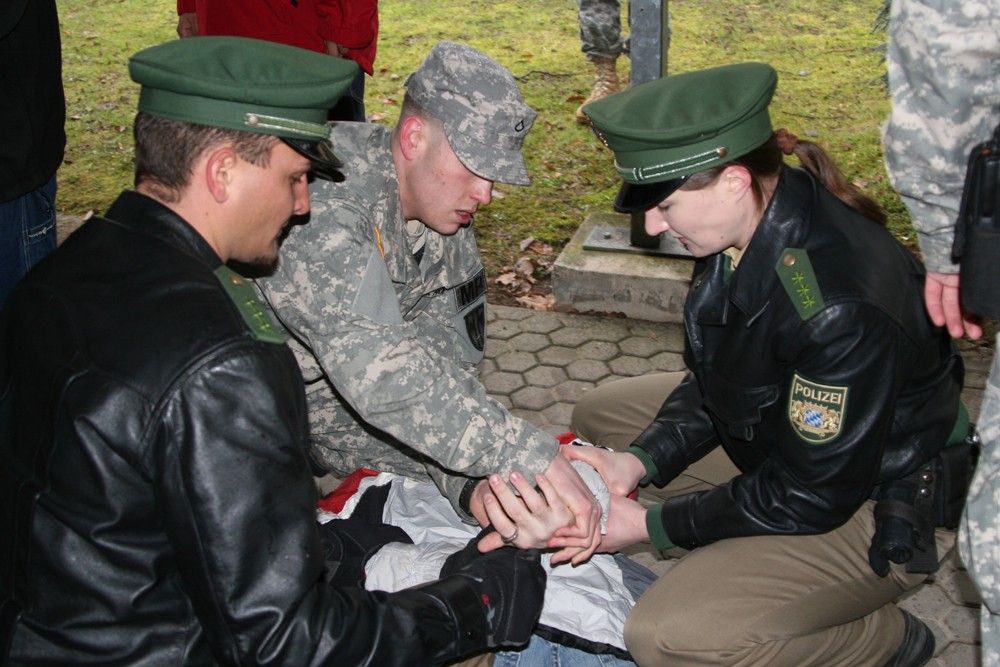ANSBACH, Germany -- Military police from U.S. Army garrison Ansbach and local German Polizei recently came together for a training session to ensure better coordination during incidents off base.
Both organizations hoped the training would help break down language barriers and solve challenges between the two police corps when they come together at the scenes of incidents involving Americans, said Sgt. 1st Class James Hicks, provost sergeant for the Ansbach military community who helped coordinate the training.
"Today's training was purely designed to get the MP's to interact with the German Polizei in a training environment, so they are aware of how things can go and how to deal with situations," said Hicks. "Bridging together and helping each other out to identify tactics, finding problems we have had and identifying solutions to those problems were the goals."
To do that, bringing together the two forces was a must.
"The difference in this training and the training regular MP Soldiers receive was that there were different languages being spoken with a totally different foreign police force," said Hicks. "This is a big issue when the Soldiers work the road. Some Germans do not speak the best English and the Americans not the best German."
To help bridge that gap above and beyond the training, Hicks said that key phrase cards are in development and will be issued soon.
"It is like a key medical phrase book, but a card with key police phrases -- both in English and German, similar to some of our investigative forms," he said.
With immediate after-action briefings and feedback sessions of the day's events, the two law enforcement agencies worked together to overcome barriers with communication, observe tactics, learn the other's language and cement working relationships.
Thomas Kastner, a Polizei weapons trainer, said the training was worthwhile.
"This is something new," he said. "It is important to train under real situations. It provides both sides the chance to train and see what can happen. When they train in this environment, they are better off than trying to learn when it is an actual incident."
Uwe KAfAPhler, local Polizei liaison with the garrison and officer for public safety, said working together is the purpose and the training scenarios are realistic.
"Last year we had joint venture patrols and it worked, but there were some initial investigation problems with the German and American rumbles at local clubs between the two different patrols that did not work."
Hicks explained that the training helps with this problem.
"It gives our foot Soldiers better preparation and the knowledge when they respond to an incident off the installation -- they know what to expect and how the Polizei are going to act, understand the tactical side of how they handle cases and deal with people off post," said Hicks.
"This training was not designed for the senior non-commissioned officer or the officers," said Hicks. "It was designed for the brand new Soldier just arriving to Germany who has never worked or performed law enforcement before."
Participant Pfc. Catherine Jones, a target Soldier, sums up the training.
"I have never had to do this before. It is a good experience because if I went out there tomorrow without this training, it would be harder for me," she said. "It offers safety, not only to your partner, but also to the German police."
Although it is a good exercise, Ansbach Polizeidirektor Heinz Hegendoerfer says there is still work to do.
"It is going to take some work, it will not be easy," he told Command Sgt. Maj. Lee Kennedy, 12th Combat Aviation Brigade command sergeant major. "This is the first step, to talk about it.
"This way we can create a common base of understanding for situations and through contact and training, we can assure things will be handled the way they should be," he added.
Kennedy called the efforts "phenomenal" and wants to see dual patrols.
"Like we had in Kitzingen just a few years ago. The American MPs would ride in the Polizei vehicle and vice versa, and they cooperated wonderfully under big responsibilities," said Kennedy. "They became friends and could practice each other's language-using key words-making the community one big solid organization. If we can get our MPs and GPs in one patrol car, that's what we really want."
The command sergeant major said the whole idea is to bring the two communities together.
"With this kind of teamwork in our community, hopefully it will spread and be contagious," said Kennedy. "If our MPs and local police force work together, our fire departments will work together, our medical services will work together, developing a solid friendship. That is the ultimate goal, to be friends -- not two different communities sharing one area, but one community."


Social Sharing